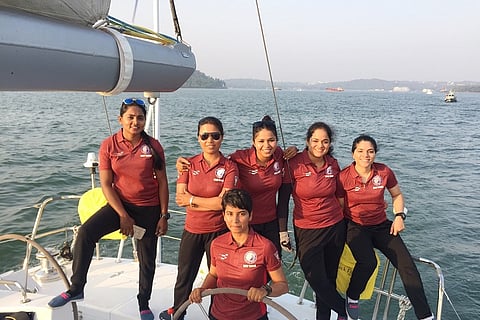

Twenty hours of a virulent storm, frost bites and hostile weather conditions. For Lt. Commander Aishwarya Bodupati and her five colleagues, the first all-women Indian crew to circumnavigate the earth, these were testing times in the waters of the South Pacific Ocean.
“I suffered severe frostbites in my fingers even after wearing eight layers of winter protection clothing. But in the end, we endured it together as a team and came out successful,” says Aishwarya.
Aishwarya Bodupati, a native of Hyderabad, is among the six women navy officers who have been awarded the ‘Nao Sena Medal’, a gallantry award for courage and devotion to the Naval force.
Speaking to TNM, Aishwarya says the award is another reminder of the huge social responsibility the women have been entrusted with after completing their voyage.
“I am really happy that the government has given due recognition to our 254-day journey in the sea. But at the same time, every award and recognition is a reminder of our increasing responsibility towards the women of this country. A reminder to keep up hope and not let them down,” Aishwarya says.
A BTech graduate in metallurgy, Aishwarya’s father was an officer with the CISF. “I studied in the Air Force school at Hakimpet in Hyderabad. Right from my days as a teenager, I was amazed by the adventures of the men in the armed forces and wanted to join the service. So becoming a naval officer was a dream I nurtured from my childhood,” Aishwarya says.
Aishwarya along with Pratibha Jamwal, Swati P, S Vijaya Devi, Payal Gupta and Vartika Joshi set out on this arduous journey on September 10, 2017, in the Indian Naval Sailing Vessel INSV Tarini.
According to Aishwarya, the trip around the globe was the brainchild of Rtd. Vice Admiral Manohar Avati.
“He often asked why were no expeditions made on the oceans, which was an important mode of transit during our maritime trade. Our trainer Dilip Donde was the first Indian to circumnavigate the globe from the Navy in the project ‘Sagar Parikrama’ in 2009. Later in 2012, Abhilash Tomy became the first Indian to circumnavigate the Earth in 151 days without any halt. We, as a team, were selected for the voyage in 2014 and underwent an extensive training at Kochi for three months,” she recalls.
It was not easy convincing family
Though a CISF officer, Aishwarya’s father was not happy with the prospects of his daughter venturing into the sea. Like any other parent, he advised Aishwarya that no good marriage prospects would come her way if she set out touring the world.
“I had a tough time convincing my parents about the voyage. First of all, a woman navy officer was a profession unheard of in our family circles. But luckily, while I was training in Goa, I got an opportunity to take my parents out on a sail for a day. Adding to the advantage was the pleasant weather. By the end of the trip, my father was so impressed that he asked if we could make some room for him during our 254-day voyage,” Aishwarya chuckles.
A matter of survival instincts
Aishwarya says that she was clueless about the sea and its perils before she became a part of the six-membered team.
“Out of the 30 women who had applied, six of us were shortlisted based on the little survival skills we showcased. But after I was told about the flare-ups at sea, I even had second thoughts about joining the team,” Aishwarya shares.
Before the brave women-team set sail in September, they made a small voyage in the Indian Ocean in INSV Mhadei to Mauritius, which by then, was a nine-year-old boat.
“Since the boat was old, it had minor leaks and repairs. Also, we ran out of water and food soon. So the trip was a tutorial for us on how to manage food, water and even electricity during the big voyage,” she says.
During the 254-day journey, they learnt to fight solitude, sought out their difference in opinions, to cook, to save water and how not to be choosy.
“We had two water tanks on board - an RO plant to purify water and bottled cans of water. The tanks got contaminated as it was close to the fuel tank; the RO plant’s faulty pipes burst. And we were only left with water cans. Soon, taking a bath became a luxury. Whenever it rained in the seas, we stepped out with soaps and shampoos and had a cosy bath,” smiles Aishwarya.
To fight boredom is a survival instinct, the officer says. “We stocked our boat with food at each stops. When the weather was not rough, we devoured on books, scrabble, board games, watched movies on laptops, cooked, did some craft and knitting and even had huge fights but also made sure we reconciled in no time. Because we had set out on a gritty resolute that since we started on the expedition as a team, we would return home only as a team.”
Women in navy rarely go on warships. They are often made technical officers and given assignments offshore, Aishwarya says.
“We created history by defying rules. We realised our potential only after we set on the voyage. We, as women, should not confine our skills within certain peripheries. We should let our dreams sail. And that would make all the difference,” she signs off.